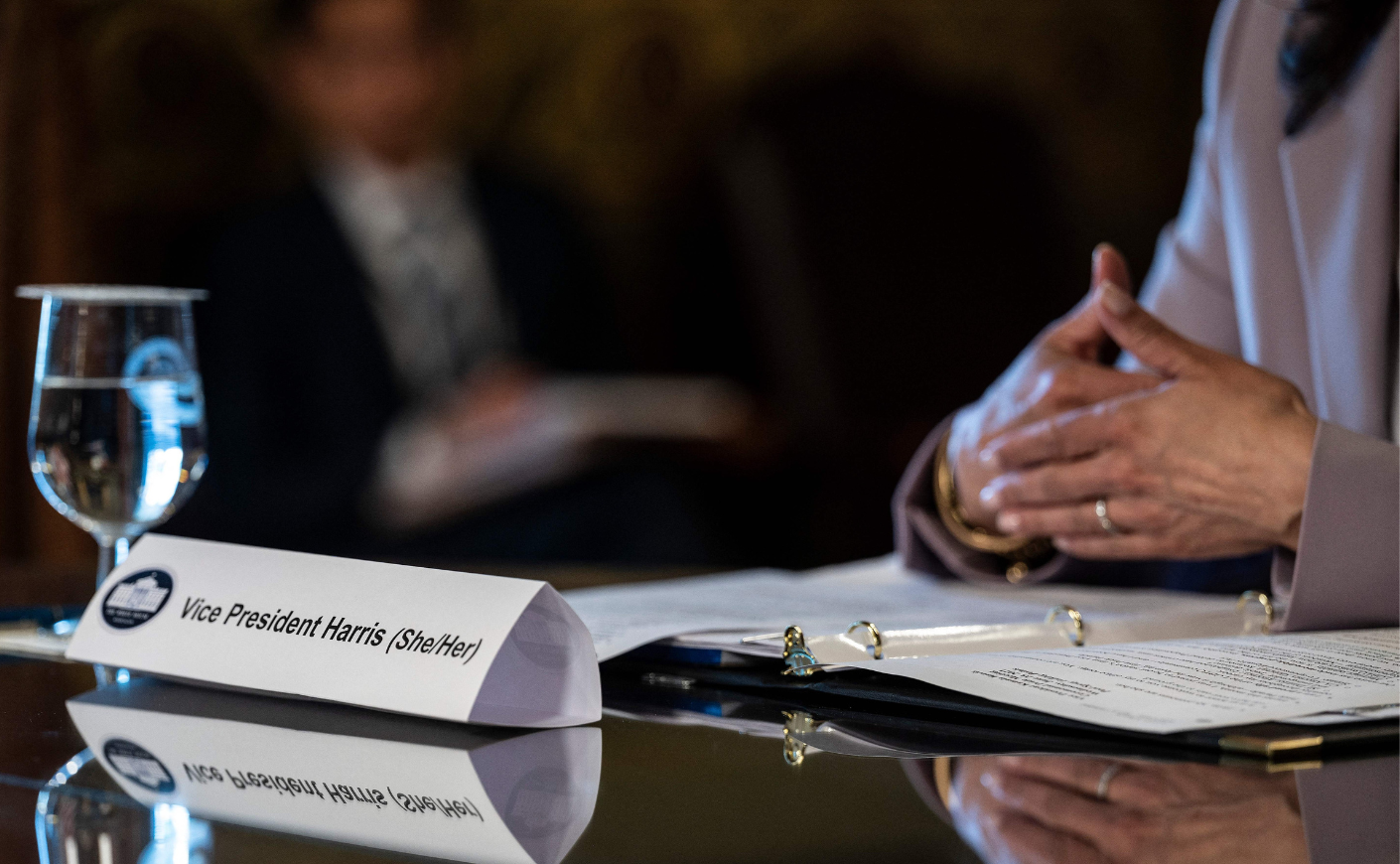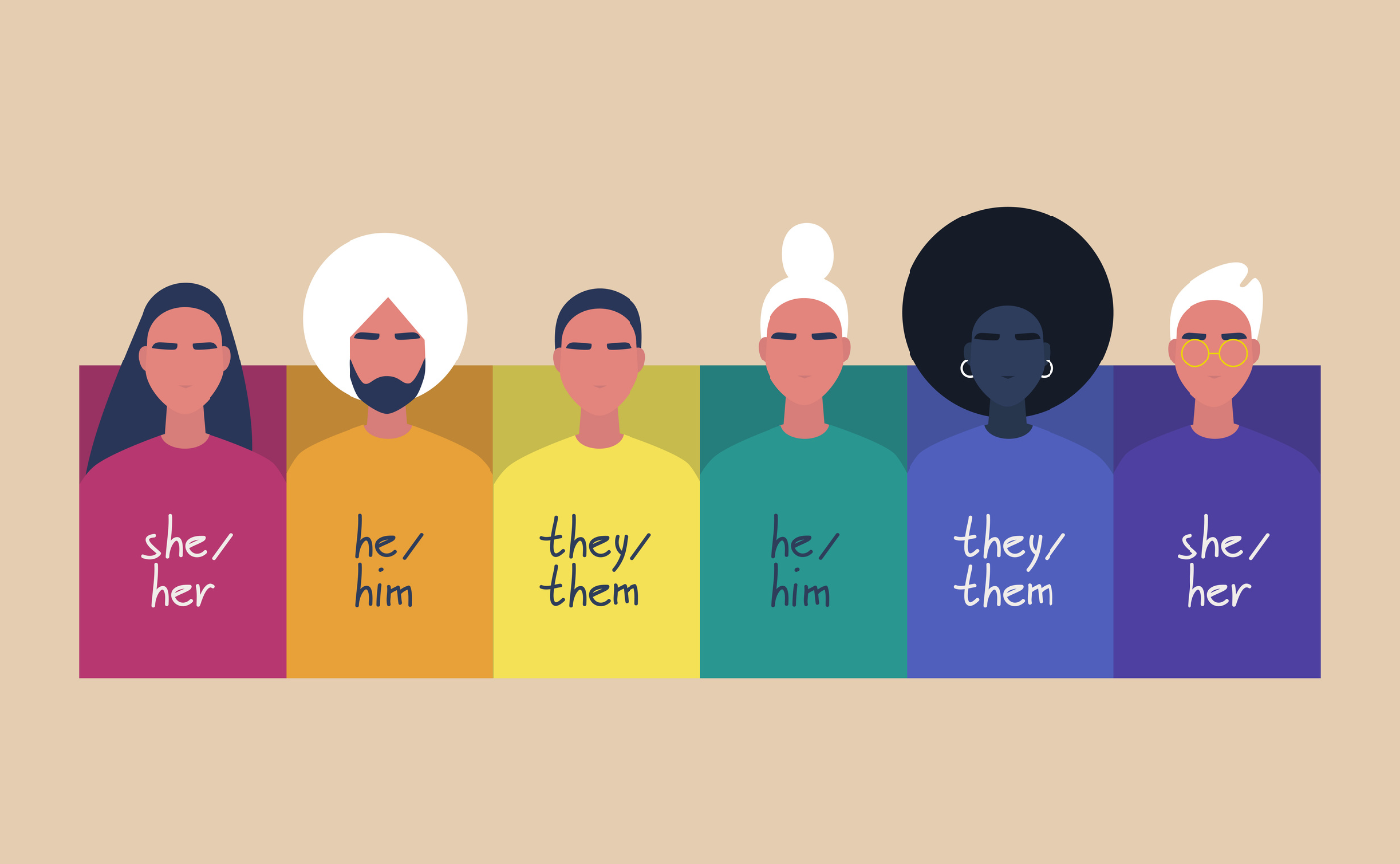I've lived in the world for 60 years, and never once has someone used the wrong pronoun for me.
Some might say that's reason enough to not add my pronouns to my email signature or wear a pronoun pin on my shirt at a conference. My pronouns are obvious. By displaying them, I'm certainly at risk for being called “woke” — not in the meaningful way it was originally used by the Black community (who coined it to describe the art of staying alert to existential societal threats), but in the way it's been co-opted by forces who have turned it into a derogatory synonym for empty virtue-signaling.
I'm willing to take that risk.
What I’m doing when I display my obvious pronouns is normalizing the behavior, making it easier and safer for others to do it, too. Can you imagine a world where the only people walking around with pronoun pins or pronouns on their name tags were the ones whose pronouns aren't obvious? Awkward!
Instead, let’s imagine a world where everyone walks around with their pronouns on their name tags. We would never have to guess at anyone’s pronouns based on what they’re wearing or how they style their hair — common but inaccurate techniques. We would never have to single someone out and uncomfortably ask, "What are your pronouns?" The information we need to respectfully refer to everyone would be right there in front of us. We’d nail it every time.
Ari (pronouns they/them), a participant in a workshop that I facilitated recently, shared an interesting story with me. Ari had just started a new job. Their new company had no systems in place that offered employees the opportunity to share their pronouns. All of Ari’s new coworkers immediately assumed that Ari’s pronouns were she/her based on Ari’s appearance. Because the company didn’t acknowledge pronouns in any way, Ari wasn’t sure if it would be safe for them to let their coworkers know their real pronouns.
After being referred to incorrectly for a few weeks, Ari finally shared their real pronouns (and their conundrum) with coworkers whose pronouns were part of their email signatures. To Ari, the coworkers who displayed their pronouns weren’t virtue-signaling; they were ally-signaling. These coworkers ended up supporting Ari by leading the way in using Ari’s correct pronouns, encouraging others to use those pronouns, and starting the conversation about creating systems at work that offered everyone the opportunity to share their pronouns and eliminate the problem for future employees. Amazing!

Adding pronouns to your email signature, name tag, ID badge, business card, desk or door name plate, video conferencing platform, and social media pages are great ally actions. Every person who shares their pronouns, even when they're obvious, is helping to create a culture where it's the normal thing to do.
Time for a pop quiz:
People who have the wrong pronouns used for them are…
A) Nonbinary people
B) Transgender folks
C) Anyone
The answer is C. Anyone can be misgendered or referred to by the wrong pronoun. Soccer legend Abby Wambach has spoken publicly about frequently having people use the wrong pronoun for her and thinking she’s in the wrong bathroom. Although misgenderings tend to affect trans and nonbinary folks the most, there are many trans folks who never get misgendered — and many cisgender (i.e., non-transgender) folks who do. This isn’t a transgender or nonbinary issue. This is a human issue.
Here’s another thing I do that puts me at risk for being called woke. I use the norm-busting term “cisgender.” (I just used it in the last paragraph. It comes in handy.) Norm-busting terms are words that define the majority group and help us move away from thinking about people as either “normal” or “different” — or even worse, as “normal” or “abnormal.” If we only have the word “transgender,” but not the norm-busting word “cisgender,” then we’re at risk for saying some pretty offensive things, like, “He’s not trans, he’s normal.” Norm-busting words help us understand that transgender and cisgender are just two equally acceptable ways to be.
If you’re annoyed by the idea that someone else is labeling you or informing you that you fit a classification you’ve never heard of, I get it. I remember the first time I learned that I was neurotypical.
For those who aren’t familiar with this term, it describes people with typical neurological developmental or functioning. (Notice the intentional use of the word typical here, instead of normal? So much more respectful.) It also describes people who aren’t neurodiverse (i.e., characterized by autistic or other neurologically atypical thoughts or behaviors). I’m neurotypical, and I was even before there was a word for being this way. But when I first heard this word, I thought to myself, “Really? Now this? How can I be something that I don’t even know about?” So I completely understand why some people balk at new norm-busting terms and make comments like, “I don’t believe in labels. I’m just human.”
I now embrace the term neurotypical and use it to refer to myself in certain situations. Why did that change? One thing that happened is I realized that the folks who make statements like, “I don’t believe in labels, I’m just human” tend to be those who fit into expected societal norms (i.e., straight, cisgender, non-disabled, hearing, neurotypical, etc.), as I do. Other people make the correct assumptions about us without our having to state our identities. For example, I never needed to educate anyone about the fact that I’m a hearing person. Strangers talk to me all the time in line at the grocery store or lean out of their car window and ask me for directions. They assume I can hear, and they’re correct. There’s no need for me to walk around sharing that I’m hearing.
It’s much more difficult to move through the world without using any identity terms when the world is set up so that people make false assumptions about you or exclude you. Identity terms are necessary for folks who aren’t in the majority (i.e., Deaf folks, LGBTQ+ folks, neurodiverse folks) in order for them to be included, get their needs met, and gain access to spaces and events.
Sharing pronouns and using norm-busting words is not political correctness gone awry. These are actions that help reject the idea that there are normal people and there are weird deviants. I highly recommend both actions. Know that if you embrace them, you’re putting yourself at risk for being called woke — but there are worse things that could happen to you, such as allowing your fear of being called a silly name get in the way of making the world a better place.
Jeannie Gainsburg is an award-winning educational trainer and consultant in the field of LGBTQ+ inclusion and effective allyship. Formerly the education director at the Out Alliance of Rochester, N.Y., she is the founder of Savvy Ally Action and author of the book The Savvy Ally: A Guide for Becoming a Skilled LGBTQ+ Advocate. The second edition of The Savvy Ally was published in April 2023.









